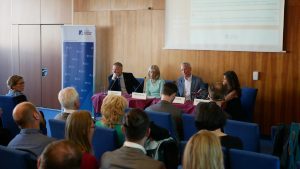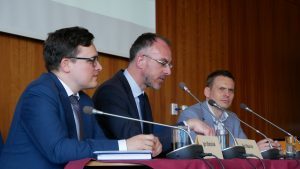FIR organized the 11th edition of the European day
The 11th edition of the European day at VŠE took place on April 17, 2019 in the premises of the Academic club. This year’s topic was revolving around revision of Czech membership in the EU.
The three panels were discussing development of the Czech Republic’s positions in the EU after 15 years of its membership, the potential that hasn’t been yet used to the full, and further directions of integration process as well as the country’s role in it.
The event was officially opened by the Dean of Faculty of International Relations Josef Taušer. In his speech he mostly focused on internalization of the FIR students. After welcoming words the floor was taken by the Director of the Centre of European Studies Jarolím Antal. He mentioned that membership in the EU can’t be looked upon only from a perspective of advantages and disadvantages, but mostly from a perspective of constructive solutions to the problems that limit the Union. The director of the fund Konrad Adenauer Stiftung Matthias Barner also had a chance to thank the Faculty.Mr. Barner stated that in order to be stronger Europe needs more than just a French-German engine and at the same time it is crucial to respect cultures of all the member states to enable closer cooperation.
Michaela Hergetová from Česká televize started the first panel on the topic of “The Czech Republic in the European Union. What has changed since the accession?”. The former Minister of Foreign Affairs Cyril Svoboda, the former Minister of Agriculture Milena Vicenová, and the Chairman of Senate committee for European affairs Václav Hampl exchanged their opinions. Cyril Svoboda evaluated the current situation around Brexit and reminded that we shouldn’t forget about the fundamental rule of keeping together. Milena Vicenová mainly aimed her speech at latest Czech presidency in the EU and drew attention to the fact that such topics as adoption of the Euro and migration lack clear and rational discussion in Czechia. Václav Hampl shared his thoughts on Czech euroscepticism and its reasons.
The second panel “The changing role of Czechia in the EU and the European budget” touched upon a new setting of Multiannual Financial Framework for 2021-2027. Pavlína Žáková, an economic counsellor for representation of the EU in the Czech Republic, introduced priorities of a new fiscal period and its implications for the country. Michal Částek, the head of EU Budget committee of the Czech Ministry of Finances, pointed out at the role of financial sources coming to the country from the EU since joining the Union. Petr Zahradník, a member of the European economic and social committee, paid attention to the Czech budget and emphasized those spheres where engagement of Czech subjects is not sufficient, for instance, community programs. The debate was dedicated not only to usage of EU fonds on the Czech Republic, but also to convergence and real improvement of economic development of the country.
 The topic of the third panel was “The future of the EU: French-German engine?”. A word of welcome was taken by the moderator Ondřej Houska, Editor-in-Chief of Economic news; he welcomed the participants and introduced two guests. The first of them was Eric Maurice from a respected think-tank Schuman Fondation. The second guest was Igor Blahušiak, the head of EU Affairs Information Department, Government of the Czech Republic. Eric Maurice started with some interesting thoughts to consider. He mentioned there is no other equally strong state that could forge the EU’s direction of development than France and Germany. Mr. Blahušiak also stated that more attention needs to be paid to the issues that are relevant to the majority of the Czech. The both agreed on the fact that the Czech Republic should be more active in the EU and its bilateral relations.
The topic of the third panel was “The future of the EU: French-German engine?”. A word of welcome was taken by the moderator Ondřej Houska, Editor-in-Chief of Economic news; he welcomed the participants and introduced two guests. The first of them was Eric Maurice from a respected think-tank Schuman Fondation. The second guest was Igor Blahušiak, the head of EU Affairs Information Department, Government of the Czech Republic. Eric Maurice started with some interesting thoughts to consider. He mentioned there is no other equally strong state that could forge the EU’s direction of development than France and Germany. Mr. Blahušiak also stated that more attention needs to be paid to the issues that are relevant to the majority of the Czech. The both agreed on the fact that the Czech Republic should be more active in the EU and its bilateral relations.
The event was organized by Center of European Studies, Faculty of International Relations VŠE, in cooperation with the partner organization Konrad Adenauer Stiftung.